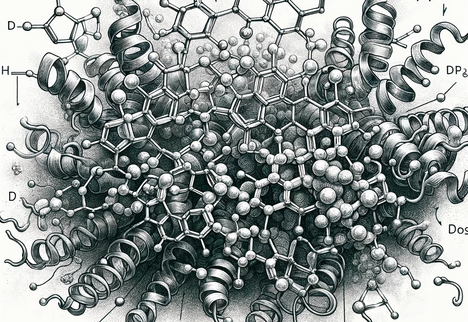Peptidases

What are peptidases?
Peptidases, also known as proteases, are enzymes that break down proteins into smaller peptides or amino acids. These enzymes are found everywhere in nature, from microorganisms to higher organisms, including dogs. In a dog's digestive tract, peptidases play a crucial role by breaking down dietary proteins into smaller, more easily absorbed units. This process is essential to a dog's diet, as proteins are an essential source of energy, growth and cell repair.
Benefits of peptidases for dogs
Improved nutrient absorption
By breaking down proteins into their building blocks, peptidases enable efficient nutrient absorption. Amino acids released through the digestive process are responsible for many critical functions in the dog's body, including muscle building, repairing tissue damage and supporting the immune system.
Supporting digestive health
Healthy peptidase function contributes to overall digestive health. By facilitating the digestion of proteins, they help prevent problems such as bloating, constipation or diarrhea that can occur when larger protein molecules are not fully digested.
Prevention of food allergies
In some cases, peptidases can help reduce the risk of food allergies. Allergies often develop in response to larger protein fragments in food that the immune system recognizes as a threat. By completely degrading these proteins, peptidases can neutralize potential allergens before they trigger an immune response.
Disadvantages and considerations
Imbalance and diseases
An imbalance in the production and activity of peptidases can lead to digestive disorders and nutritional deficiencies. Too few peptidases can cause incomplete protein cleavage and associated digestive problems, while an excess can lead to excessive cleavage and thus loss of important peptides.
Challenges in diagnosing deficiencies
Identifying a peptidase deficiency can be difficult as the symptoms are often non-specific and can be confused with other digestive problems. An accurate diagnosis often requires extensive veterinary investigation.
Nutritional management
For dogs with confirmed peptidase deficiency or dysfunction, dietary adjustments can be challenging. Specialized diets containing more easily digestible proteins or already hydrolyzed proteins may be necessary to aid digestion and avoid nutrient deficiencies.
Peptidases are essential players in our dogs' digestive systems, playing a central role in the processing and absorption of proteins. While they provide numerous nutritional and health benefits, imbalances can lead to digestive issues and other challenges. Proper nutrition and medical support, if needed, can maximize the benefits of peptidases and maintain the health and well-being of our loyal companion.
If you notice any signs of hypersensitivity or poisoning in your dog, you should see your vet immediately. We are not a substitute for a vet, but we try to be as accurate as possible. Every dog reacts differently and we recommend you get a second opinion or consult your vet if in doubt.
Stay healthy and take good care of your four-legged friend!😊